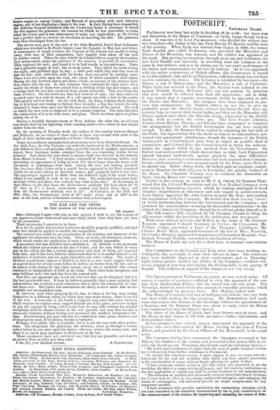PO8TSCRIPT.
SATURDAY NIGHT.
Parliament was busy last night in finishing off its work; but there MLR ' one discussion, in the House of Commons, on Syria, begun though broken short. It was raised by Lord PALMERSTON; who divided the subject into two branches—the claims of the late Emir Besehir El-Kassim, and the state of the country. When Syria was wrested from Egypt, in 1840, the former Emir Beschir, also called El-Kassim, who governed the Marouites and Druses of the Mountain, was deposed, and his relative was appointed in his stead. But proving incompetent, through great age and feebleness, the new Emir Besohir was removed; in travelling from the Lebanon to the coast he was robbed; and now lie claims pay for one year's performance of his duties, and compensation for his loss by robbery. As he was appointed with the active concurrence of British officers, this Government is bound to see him righted; but, said Lord Pahnerston, sufficient energy has not been used in enforcing his claims. The Lebanon is inhabited by two races—the Druses., a sort of Mahometans, and the Maronites, a sort of Christians. When Syria was restored to the Porte, the Syrians were induced to rise against Ibrahim Pacha, Mehemet Alfs son and general, by promises that they should be relieved from their old oppressions; and in 1842, it was agreed that a separate Government should be appointed to rule the Druses and Maronites. But intrigues have been employed to pre- vent that arrangement: the Turkish officers do not like to give up profitable posts; the Shebat) family, whence the Emirs Beschir were aps pointed, hope to recover their feudal rights, and they set the Maronites and Druses against each other; the Maronite clergy, patronised by the Shelab family, wish to restore the status quo. The Five Powers (Austria, France, Great Britain, Prussia, and Russia) have cooperated to complete the arrangement; but the British Government has not been energetic enough. To this, Sir ROBERT PEEL replied by admitting the bad faith of the Porte, but representing that the desire to respect its independence pre- vented very peremptory interference; though the instances of the British Ambassador at Constantinople bare been as urgent as possible short of compulsion; and Colonel Rose, the Consul-General in Syria, has acknow- ledged the support which he has received from his Government. Sir Robert read correspondence which showed that, in 1841, Lord Palmerston himself laboured ineffectually against precisely the same difficulties. However, that morning a communicatiou had been received from Constan- tinople which mentioned a new proposal made by the Porte, more likely to be carried out Before sitting down, Sir Robert paid an emphatic compli- ment to Members for their diligence in forwarding the private business of the House. Sir CHARLES NAPIER rose, to continue the discussion on Syria; but the House was "counted out."
Earlier in the evening, in reply to Mr. J. A. Starrn, Sir ROBERT PEEL stated that the Colonial Department and the New Zealand Company were now acting in harmonious concert; which he entirely attributed to Lord Stanley's forgetfulness of differeuces and sole regard to public intereste. Lord Stanley appointed Mr. John Lefevre to assist Mr. Hope and conduct the negotiations with the Company. He denied that there was any "cross" or secret understanding between the Government and the Company; and promised his consideration—meaning his favourable consideration—to the subject of a loan to the Company; though he would not pledge himself to it.
The Silk-weavers Bill, explained by Sir GEORGE CLERK to bring the silk-weavers within the provisions of the Arbitration Act, was passed.
Writs were ordered to issue—for Belfast, in the room of Mr. Emerson Tennent, appointed Colonial Secretary in Ceylon ; for Cirencester, Mr. William Cripps, appointed a Lord of the Treasury; Linlithgow, Mr. Charles Henry Hope, appointed Governor of the Isle of Man ; Warwick, Sir Charles Douglas, appointed Commissioner of Greenwich Hospital; Sun- derland, Viscount IIowick, succeeded to the Earldom of Grey.
The House of Lords sat only for a short time, to transact some routine. business.


























 Previous page
Previous page